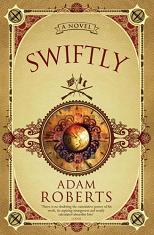
Swiftly
Adam Roberts
359 pages
published in 2008
I'm not a great fan of Adam Roberts, as my reviews of his first two novels, Salt and On, as well as his first book on science fiction show. He has a style of writing that is too flat and detached for my liking, a penchant for using unlikeable characters as his protagonists, some difficulty in creating a good story and a view of science fiction I don't share. In both Salt and On Roberts had created interesting settings, but fell down on providing the characters and story to do justice to them.
Swiftly, not to be confused with his earlier collection of short stories also called Swiftly, is Adam Roberts' latest novel, a continuation of Jonathan Swift's classic proto-science fiction novel, Gulliver's Travels. Roberts takes Swift's satire on early eigthteen century Britain and Europe and imagines what could've happened if Lilliput, Brobdingnag, Laputa and the Houyhnhnms were real, what the world could've looked like almost one and a half centuries later, in 1848. Now there are huge armies of Liliputians (or rather the more reliable Blefuscudians) working in England's industries, bought and sold as so many animals. The Houyhnhnms have been enlisted as His Majesty's Sapient Cavalry, while the Royal Navy has killed most of the Brobdingnagians as a menace to the British Empire. There's another war with France going on, one England is winning handily, laying siege to Versailles.
Abraham Bates doesn't like this state of affairs. A man of strong religious convictions, he has become a radical agitator for the emancipation of the Lilliputians (and Blefuscudians). If God had wanted these creatures to be enslaved, he would not have made them into His image. Which is why, reluctantly, he has also become an agent for the French, though not a very important one, in the hope that they will provided liberation to the Lilliputians. His hopes seem to come through when the French enlist the surviving Brobdingnagian giants in their army and with their might they don't just crush the English army in France, but also the Royal Navy guarding the Channel and hence France is able to invade. French victory might put Bates in favour with the invaders, but to his fellow Londoners he's just a traitor, so he isn't too unhappy when he's sent on a mission to York, away from where people know him as a friend of France...
The second part of the novel introduces Eleanor, daughter of impoverished aristocracy, her father dead seven years, who is to be married to the industrial Jonathan Burton. Eleanor is highly intelligent and interested in all sorts of science, but as befitting her position and sex, unschooled in the ways of the world. Ignorant of sexual matters until certain incidents make her aware of that side of life, at which point she treats it as yet another research subject, to be investigated in the same matter as she approaches her interests in economics or physics. Her husband to be turns out to be interested in scientific matters as well, but his hopes for a soulmate are soon dashed after the marriage has been consummated and things for him go from bad to worse.
The next time we see Eleanor, she's on the road to the north, where Bates encounters her on his mission to York. How and why she got there isn't told. Travelling with Bates and his companion the Dean of York, both she and the Dean fall ill of the same disease Abraham succumbed to earlier. Horrified and revulsed by her condition, Abraham attempts to clean her up when Eleanor soils herself. Disgusting as this is, and Roberts does not spare the reader, it's the central incident that drives the rest of the novel. For Abraham the incident is not just disgusting, but arousing, while Eleanor is at first revulsed by Bates, but not adverse to use him for her own ends.
Taking Swift's work and using it as the fundament under your own novel is audacious, even foolhardy, as inevitably you will be compared to Swift himself, a comparison from which few writers emerge the better. In Swiftly Roberts does not just borrow Swift's ideas, but he also throws in another eighteenth century proto-science fiction novel, Voltaire's Micromégas, in which a giant being from Sirius visits Earth, which compared to the Brobdingnagians is as big again as the Brobdingnagians are to us. And Roberts doesn't stop here either, but also extends Swift's scale at the other end, by making the cause of the plague be microscopic beings that are to the Liliputians what they are to us.
Roberts ambition doesn't stop with concretising Swift's and Voltaire's metaphors. Swiftly is a deliberate throwback to the eighteenth century idea of what a novel is, back to the roots of the artform. Swiftly is episodic in nature, even rambling, with big gaps in the storyline between episodes and with the protagonists as much spectators as participants in the story. Much of the wider story, what's happening in the world beyond Abraham and Eleanor is left unstated and left for the reader to construct themselves. Plotlines are set up and abandonded when something else comes up and even the characters themselves change inbetween chapters, Eleanor especially. In short, Swiftly lacks consistency.
Does this work? I'm not sure. For me Swiftly didn't gel, didn't have anything that made it more than an interesting but failed experiment. It's great that Roberts tries to recapture the looseness and freedom of the eighteenth century novel, but something needed to be done with that looseness. This novel needed to be inventive to keep interest in the story going, but it wasn't inventive enough. Combining Gulliver's Travels with Micromégas is a neat idea, but nothing interesting is done with it. In the end Swifly had the same flaws that I disliked in Roberts' earlier works.
Read more about:
Adam Roberts,
Swiftly,
science fiction,
book review